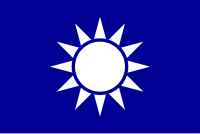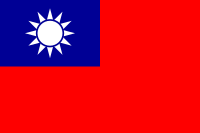Dang Guo
This article includes alist of references,related reading,orexternal links,but its sources remain unclear because it lacksinline citations.(April 2022) |
Dang Guo(Chinese:Đảng quốc;pinyin:Dǎngguó;lit.'party-state'), also known asTang Kuowas theone-party systemadopted by theRepublic of China(ROC) under theKuomintang,lasting from 1924 to 1987. It was adopted afterSun Yat-senacknowledged the efficacy of the nascentSoviet Union'spolitical system,including its system ofdictatorship.Chiang Kai-sheklater used the Kuomintang to control and operate theNationalist governmentand theNational Revolutionary Army.All major national policies of the governmentbureaucracywere formulated by the Kuomintang, giving the party supreme power over the whole nation.
Following the beliefs of Sun Yat-sen, political power should have been returned to the people after the National Revolutionary Army militarily ended theWarlord Era.However,martial law in Taiwancontinued from 1949 until 1987, during which other political parties were banned. Martial law was lifted in 1987 bypresidentChiang Ching-kuo,a move that legalized other political parties such as theDemocratic Progressive Partyand ended theDang Guoera.
Origin
[edit]Dang Guowas short forYi Dang Zhi Guo(Dĩ đảng trị quốc), which literally means "using the political party to run the state". In 1920,Sun Yat-sen,founding father of the Republic of China, madeDang Guothe official ROC national policy during the phase ofmilitary ruleandpolitical tutelage(two of the three phases of the Fundamentals of National Reconstruction). He was influenced byLeninistideology, which led to theOctober RevolutioninRussia.According to Sun, the Kuomintang should be paramount over the Republic of China in the course of revolution (war against the warlords) and should issue orders to the ROC bureaucracy, allNGOgroups, and indeed to all individuals.
In 1924, Sun said:
- Đương nga quốc cách mệnh thời, dụng độc tài chính trị, chư sự nhất thiết bất cố, chỉ cầu cách mệnh thành công……, kỳ năng thành công, tức nhân kỳ tương đảng phóng tại quốc thượng. Ngã dĩ vi. Ứng trọng tân tổ chức, bả đảng phóng tại quốc thượng.
- Dāng éguó gémìng shí, yòng dúcái zhèngzhì, zhūshì yīqiè bùgù, zhǐ qiú gémìng chénggōng..., Qí néng chénggōng, jí yīn qí jiāng dǎng fàng zài guó shàng. Wǒ yǐwèi. Yīng chóngxīn zǔzhī, bǎ dǎng fàng zài guó shàng.
- During theRussian Revolution,political dictatorship was used, everything else can be discarded, the only aim was the success of the revolution... its success was because the party (Russian Communist Party (Bolsheviks)) was on top of the state. I suggest... we should reorganize by putting the party (Kuomintang) on top of the state (ROC).
In practice
[edit]
After Sun Yat-sen decided to follow and copy theSovietpolitical system, his successorChiang Kai-shekused the Kuomintang to control and operate both theNationalist governmentand theNational Revolutionary Army,which was sometimes called "The Party's Army" (Đảng quân). The ROC bureaucracy had then become the means and the tools of Kuomintang, where all the major national policies were formulated, while resulted in the party holding the supreme power of the whole nation.
The concept ofDang Guowas an outgrowth of Sun's concept of "political tutelage" during which the Kuomintang was to lead the state and to instruct the people on how the democratic system would work prior to the transition to full democracy.
UnderDang Guo,ROC military personnel and civil servants alike were expected to owe their allegiance to Kuomintang first and the state second, a policy reflected by such phrases as "Service to the Party and the Nation" (Công tại đảng quốc) and in thenational anthem,which makes an explicit reference to "Our Party". Likewise, the emblem of the Kuomintang was used as theemblem of the state,and the flag of the Kuomintang has been used as thenaval jackto this day.
The Kuomintang unified China in 1927 and started to prepare the state for democracy, as according to Sun's teaching. TheConstitution of the Republic of China,enacted in 1947, stipulates that different parties shall enjoy equal status, and theNational Revolutionary Armywasreturned to civilian controlas theArmy of the Republic of China.However, the outbreak of theChinese Civil Warcaused the ROC to be under military rule of the KMT during theperiod of mobilizationwhen the ROC governmentrelocated to Taiwanin 1949.
After martial law ended in 1987, all political parties became legal, and the Republic of China was democratized. Since then, the President of the Republic of China has been democratically elected by the people ofTaiwan.In 2000,Chen Shui-bianof theDemocratic Progressive Partywas elected as the first non-KMT president under the Constitution.
See also
[edit]- Chinese state nationalism
- Neoauthoritarianism
- Particracy
- Party-state capitalism
- Transitional Justice Commission
- Wild Strawberry student movement
Sources
[edit]- Xia, Ming."The Communist Party of China and the" Party-State "".The New York Times.
- Trương anh hồng: Tôn trung sơn đích dĩ đảng trị quốc tư tưởng(in Chinese)(Google translation)
- Tôn trung sơn “Dĩ đảng trị quốc” tư tưởng đích hình thành cập kỳ ảnh hưởng(in Chinese)
- Ngô mẫn: Dĩ đảng trị quốc thị quốc dân đảng đích di độc(in Chinese)(Google translation)
- Thiển nghị tôn trung sơn đích dân chủ hiến chính tư tưởng đối đương đại trung quốc dân chủ chính trị dữ quốc gia hiện đại hóa đích khải kỳ tác giả: Lý xương canh(in Chinese)[permanent dead link](Google translation)



